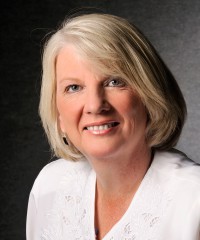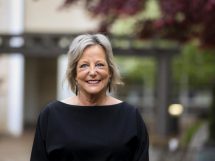Kimberly Ward Anderson is a professor of chemical engineering
By Whitney Harder
UK Now
LEXINGTON, Ky. (March 17, 2015) — Kimberly Ward Anderson, Gill Eminent Professor of Chemical Engineering and associate dean for administration and academic affairs in the University of Kentucky College of Engineering, was inducted into the American Institute for Medical and Biological Engineering (AIMBE) College of Fellows on March 16 at a ceremony in Washington, D.C.

Anderson was nominated, reviewed and elected by peers and members of the College of Fellows for outstanding contributions in research on cell membrane rheology, bioengineered surfaces, cancer diagnosis and treatment, and undergraduate and graduate education.
The College of Fellows is composed of the top 2 percent of medical and biological engineers in the country. The most accomplished and distinguished engineering and medical school chairs, research directors, professors, innovators, and successful entrepreneurs, constitute the College of Fellows.
AIMBE Fellows are regularly recognized for their contributions in teaching, research and innovation. AIMBE Fellows have been awarded the Presidential Medal of Science and the Presidential Medal of Technology and Innovation and many also are members of the National Academy of Engineering, Institute of Medicine, and the National Academy of Sciences.
Anderson joined UK in 1987 as an assistant professor in the Department of Chemical Engineering (now Department of Chemical and Materials Engineering) and faculty associate in the Center of Membrane Sciences. She later served as the department’s director of graduate studies from 1993-1996, a faculty associate in the Department of Biomedical Engineering, then the associate dean for administration and academic affairs in the College of Engineering from 1996-1999.
Today, Anderson continues her work in the Center of Membrane Sciences, Department of Biomedical Engineering and the Department of Chemical and Materials Engineering as the Gill Eminent Professor, and again serves as the associate dean for administration and academic affairs in the College of Engineering. She also currently serves as director of a National Science Foundation (NSF) Research Experiences for Undergraduates (REU) program, focusing on engineered bioactive interfaces and devices.
Anderson’s research interests include biocompatible surfaces, cancer cell metastasis, cell-based biosensors, and microfluidic devices for biological applications. She has received research funding from the NSF, including a Presidential Young Investigator Award, the National Institutes of Health (NIH), the Department of Energy and NASA.
Since joining the university, Anderson has mentored more than 45 graduate students and 60 undergraduate students on research projects in her laboratory, as well as area high school students.
Recognized for her efforts and research for many years, Anderson has been awarded the Excellence Award in Undergraduate Education from UK, the Sarah Bennett Holmes Award for her efforts at promoting and advising women students, and a UK research professorship. In 2011, she was awarded the Henry Mason Lutes Award for Excellence in Teaching, and in 2012, she was awarded the Provost’s Outstanding Teaching Award and Outstanding Research Mentor Award.
Anderson, formally inducted during AIMBE’s 2015 Annual Meeting at the National Academy of Sciences Great Hall in Washington, D.C., was inducted along with 151 colleagues who make up the AIMBE College of Fellows Class of 2015. For more information about the AIMBE Annual Meet, please visit www.aimbe.org.
AIMBE’s mission is to recognize excellence in, and advocate for, the fields of medical and biological engineering in order to advance society. Since 1991, AIMBE‘s College of Fellows has led the way for technological growth and advancement in the fields of medical and biological engineering. Fellows have helped revolutionize medicine and related fields in order to enhance and extend the lives of people all over the world. They have also successfully advocated for public policies that have enabled researchers and business-makers to further the interests of engineers, teachers, scientists, clinical practitioners, and ultimately, patients.



















Add Comment